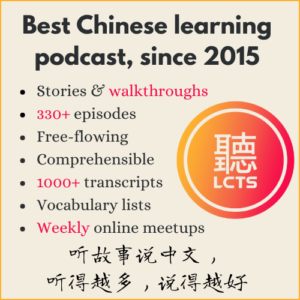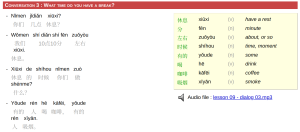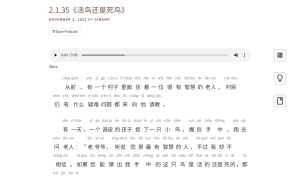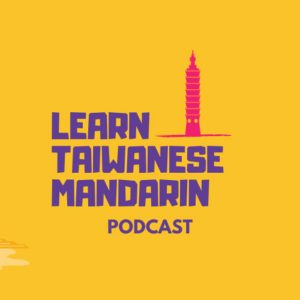
In this article, I will share the best free Chinese listening resources for beginner, intermediate and advanced students. I have spent years collecting resources and these are the best free ones I’ve found!
Listening and reading are the most important aspects of learning Chinese. Without enough input, you’re not going to perform well in other areas of the language either. Lots of listening and reading will help you develop a feel for how the language is used. Speaking is the tip of the iceberg, visible over the surface; listening is the bulk volume under the surface that makes it float.
Tune in to the Hacking Chinese Podcast to listen to the related episode (#210):
Available on Apple Podcasts, Spotify, YouTube and many other platforms!
Skip directly to the overview by clicking this link (but I strongly recommend you don’t, because there are some important things I want to say first).
You don’t listen to enough Chinese
Students don’t listen anywhere near as much as they should. It’s not enough listening to your teacher, the texts in your textbook and a podcast here and there. Your total time spent listening should be equal to or greater than all other types of learning combined.
This is not because listening is more important, but because it’s so easy to do compared with any other type of practice. You can listen while walking, commuting, cooking and exercising. If you struggle to find enough time to practise listening, try the advice I offer here: 7 ideas for smooth and effortless Chinese listening practice.
Free Chinese listening resources for beginner, intermediate and advanced learners
Below you can find an overview of the best free Chinese listening resources. They have been separated into three levels: beginner, intermediate and advanced (links go to discussions about each level and for general advice about learning Chinese on that level).
Please note that people’s ideas of “beginner”, “intermediate” and “advanced” vary wildly. Typically, beginner content is harder than advertised and advanced content is easier compared with other languages:
- Listening resources on the lower levels are harder than advertised. You’ll find content labelled as “absolute beginner” even though it’s not beginner-friendly at all. This is probably because it’s hard to create actual beginner content.
- Listening resources on the higher levels are easier than advertised. Or, in other words, actually not “advanced” according to most international frameworks. This is because Chinese is hard to learn and creators want to encourage students to feel that they have reached a higher level.
I’ve done my best here, but note that each resource often has multiple levels within it. Thus, check a few episodes/videos/lessons before discarding a resource!
The best free Chinese listening resources for beginner, intermediate and advanced learners
Some of the resources listed here have premium content. However, the evaluations I’ve done in this article are based solely on freely available content. Creating good listening content, especially for beginners, is not easy, so many of the best resources will inevitably cost money.
If you have some money to invest in your learning, explore the free options below and pay for those you find helpful. I’ve written more about resources worth paying for here, but not everyone can afford to pay for their learning, so the rest of this article will focus on free content!
These are the best resources I know of! I will update this article with better resources if I can find them. If you know of a good one I haven’t mentioned here, please leave a comment below!
- What to listen to, how to listen and how much you should listen
- A few practical tips for improving listening ability in Chinese
- Course: The Fluent Listener: Navigating Mandarin Like a Fish in Water
- Beginner
- Intermediate
- Advanced
- What’s new?
Back to free Chinese listening resources index
If you’re after reading resources instead, check out this article: The 10 best free Chinese reading resources for beginner, intermediate and advanced learners
What to listen to, how to do it and how much you should listen
Here are some of the most important insights into improving listening ability in Chinese, with links to further reading.
In general, three factors determine how much you learn: content, method and time, or otherwise what you do, how you do it and how much of it you do. This can be applied to listening practice as well:
 What should you listen to? You should listen to Chinese at roughly your level and that contains the kind of language you want to learn. This sounds obvious but can be very difficult in practice, especially for beginners. For example, podcasts in English (including my podcast) don’t count as listening practice, but neither does English spoken in learner podcasts. For this article, I discarded a vast majority of podcasts I found because they simply contain too much English! If in a ten-minute episode for beginners, there’s a twenty-second dialogue played a few times, and then some vocabulary or grammar, but the rest is in English. If you listen to this for an hour, you’ve only spent ten minutes practising your listening! I wrote more about this problem here: Can too much guidance make you learn less Chinese?
What should you listen to? You should listen to Chinese at roughly your level and that contains the kind of language you want to learn. This sounds obvious but can be very difficult in practice, especially for beginners. For example, podcasts in English (including my podcast) don’t count as listening practice, but neither does English spoken in learner podcasts. For this article, I discarded a vast majority of podcasts I found because they simply contain too much English! If in a ten-minute episode for beginners, there’s a twenty-second dialogue played a few times, and then some vocabulary or grammar, but the rest is in English. If you listen to this for an hour, you’ve only spent ten minutes practising your listening! I wrote more about this problem here: Can too much guidance make you learn less Chinese? How should you listen? The goal should be both quantity and quality (not necessarily at the same time), but since the next point is entirely about quantity, let’s talk about quality first. You learn Chinese when you connect form (spoken or written words in context) to meaning and function. If you don’t understand what you’re listening to, you won’t learn much, but the more you understand, the more likely you are to pick up the few things you didn’t already know. You want comprehensible input. Furthermore, fluency development is important, so even listening to relatively easy Chinese is beneficial. The answer to the question of how you should listen is that you should vary your approach depending on circumstances. Do active listening when you can, but otherwise passive listening is good too, and when you can’t do that either, it’s still often possible to have something on in the background.
How should you listen? The goal should be both quantity and quality (not necessarily at the same time), but since the next point is entirely about quantity, let’s talk about quality first. You learn Chinese when you connect form (spoken or written words in context) to meaning and function. If you don’t understand what you’re listening to, you won’t learn much, but the more you understand, the more likely you are to pick up the few things you didn’t already know. You want comprehensible input. Furthermore, fluency development is important, so even listening to relatively easy Chinese is beneficial. The answer to the question of how you should listen is that you should vary your approach depending on circumstances. Do active listening when you can, but otherwise passive listening is good too, and when you can’t do that either, it’s still often possible to have something on in the background. How much should you listen? As much as possible! I’ve already said this, but I think a reasonable goal is to listen as much as you do to everything else related to Chinese combined. This includes all types of listening, including listening to Chinese music while working and the like. I’ve already linked to my article about 7 ideas for smooth and effortless Chinese listening practice, but if you struggle to integrate large amounts of listening in your life, you might benefit from shaking up how you think about time management a bit. This is beyond the scope of this article, so I will just provide a few links I think are extra important: The forking path: A human approach to learning Chinese, The time barrel: How to find more time to study Chinese and How to find more time to practise Chinese listening.
How much should you listen? As much as possible! I’ve already said this, but I think a reasonable goal is to listen as much as you do to everything else related to Chinese combined. This includes all types of listening, including listening to Chinese music while working and the like. I’ve already linked to my article about 7 ideas for smooth and effortless Chinese listening practice, but if you struggle to integrate large amounts of listening in your life, you might benefit from shaking up how you think about time management a bit. This is beyond the scope of this article, so I will just provide a few links I think are extra important: The forking path: A human approach to learning Chinese, The time barrel: How to find more time to study Chinese and How to find more time to practise Chinese listening.
I’ve written dozens of articles about various aspects of improving listening ability in Chinese, some of which I have provided links to above. For more about listening ability in general, please check out the main page for listening here on Hacking Chinese.
Back to free Chinese listening resources index
A few practical tips for improving listening ability in Chinese
Here are a few practical tips for how to get the most out of the resources I have recommended below:
- Listen before you read
 – If there are transcripts, turn them off and listen first. Listen more than once, and only look at the written version once you’ve exhausted your listening ability. When you have exhausted your reading ability, look at the transcript if you must, but you’d be better off switching to a resource you don’t need to use the transcript to understand.
– If there are transcripts, turn them off and listen first. Listen more than once, and only look at the written version once you’ve exhausted your listening ability. When you have exhausted your reading ability, look at the transcript if you must, but you’d be better off switching to a resource you don’t need to use the transcript to understand.  Make the audio easy to access – Many of the resources recommended below have audio that is embedded in a way that makes it hard to access easily. If there is a podcast, use a dedicated podcast app to listen, as this is both practical and easy. If there are videos, extract the audio and put it on your phone for listening (search online for how to save mp3 from YouTube, while staying clear of illegal behaviour, of course). More advice for smooth and effortless listening can be found in the article linked above.
Make the audio easy to access – Many of the resources recommended below have audio that is embedded in a way that makes it hard to access easily. If there is a podcast, use a dedicated podcast app to listen, as this is both practical and easy. If there are videos, extract the audio and put it on your phone for listening (search online for how to save mp3 from YouTube, while staying clear of illegal behaviour, of course). More advice for smooth and effortless listening can be found in the article linked above. Build your own audio library – Save everything you listen to and like. After doing this for a while, you’ll have plenty of old audio to listen to when you don’t feel up to listening to something new. Reviewing old audio is almost as valuable as tackling new content. By making sure this is easy to do, you can maximise your listening.
Build your own audio library – Save everything you listen to and like. After doing this for a while, you’ll have plenty of old audio to listen to when you don’t feel up to listening to something new. Reviewing old audio is almost as valuable as tackling new content. By making sure this is easy to do, you can maximise your listening.
The Fluent Listener: Navigating Mandarin Like a Fish in Water
 Looking to understand Mandarin in a natural way, no matter your level? My course The Fluent Listener helps you create an immersive listening environment while providing you with key strategies to enhance your listening skills.
Looking to understand Mandarin in a natural way, no matter your level? My course The Fluent Listener helps you create an immersive listening environment while providing you with key strategies to enhance your listening skills.
Strengthen your ability to understand and engage in conversations, build connections with others, and dive deep into Chinese society and culture, making you feel 如鱼得水 (rúyúdéshuǐ), like a fish in water!
The Fluent Listener: Navigating Mandarin Like a Fish in Water
Back to free Chinese listening resources index
The 10 best free Chinese listening resources: Beginner
 As a beginner, you are mostly limited to Chinese spoken specifically with language learners in mind. Anything else will flood you with new vocabulary and will make it impossible to understand without a ton of dedicated studying.
As a beginner, you are mostly limited to Chinese spoken specifically with language learners in mind. Anything else will flood you with new vocabulary and will make it impossible to understand without a ton of dedicated studying.
The problem is that creating this kind of content is not easy, and there aren’t that many good resources available. Many podcasts, for example, are much harder than advertised, so even if you’ll find some episodes from the recommended resources that are for “absolute beginners”, they are sometimes quite hard.
Click here for advice about how to learn Chinese as a beginner
For more about beginner listening specifically, also check: Beginner Chinese listening practice: What to listen to and how
Beginner Chinese listening practice: What to listen to and how
Slow and Clear Chinese (YouTube)
 Level: Beginner
Level: Beginner
Topic: Listening
Type: Resource collection
Slow and Clear Chinese offers beginner-friendly listening practice without using any English. They can do this even for absolute beginners by using gestures, images, body language and props in their videos. This is one of the very few resources I’ve found that you can use right from day one without relying heavily on English translations and explanations (also check Bumpy Chinese and Mandarin Click). Excellent!
Pros: Only Chinese, well-produced content, clear audio
Cons: Only on YouTube (and the channel is no longer updated)
Sample video 1: Immersive Series Lesson 1 (Absolute Beginner)
Sample video 2: Life of a University Student
Back to free Chinese listening resources index
Mandarin Click (YouTube)
 Level: Beginner
Level: Beginner
Topic: Listening, Reading
Type: Resource collection
Mandarin Click is one of the best channels on YouTube for beginners. They offer many videos completely in Chinese, spoken in a slow and clear manner, with supporting images and body language. If you really want it, they also have translations to English (but you should turn subtitles off). Feel free to explore the channel, but in my opinion, it’s the playlists called Slow Chinese Stories that are the best. Also, check Slow and Clear Chinese and Bumpy Chinese.
Pros: Only Chinese content in most cases, clear pronunciation, supporting images and body language
Cons: Only available on YouTube
Sample video: 我感冒了
Back to free Chinese listening resources index
Bumpy Chinese / Comprehensible Chinese
 Level: Beginner, intermediate
Level: Beginner, intermediate
Topic: Listening
Type: Resource collection, Podcast
This is one of the best comprehensible input channels I’ve found so far! That means that she gives you plenty of listening practice without spending five minutes speaking English for every minute of Chinese. There is often no English spoken at all. The podcast version can be found by searching for “Comprehensible Chinese”, but if you’re a complete beginner, you might want to watch the videos on YouTube as well. The difficult level is carefully controlled, and the host repeats, rephrases, circles and many other things to help you understand even with a limited vocabulary.
Pros: Only Chinese, engaging, built-in repetition, rephrasing and circling.
Cons: Some episodes have to be watched (she refers to images shown on screen sometimes)
Sample video: Self-introduction in Chinese | my mum and my boyfriend
Back to free Chinese listening resources index
Learning Chinese through Stories (novice and beginner)
 Level: Beginner, intermediate
Level: Beginner, intermediate
Topic: Listening
Type: Resource collection, Podcast
This podcast is mostly free and offers episodes entirely in Chinese. The hosts do a good job of making sure you understand without relying on translation. Some episodes come in pairs, where one episode consists of a story and the other episode contains an explanation and discussion of that story in Chinese. Both types of episodes are worthwhile, but note that the story is often harder than the episode discussing it. Episodes are usually long, which is great!
Beginners should focus on episodes labelled 1.X.X first, but these can be rather hard to find. If you’re on Spotify, you can use this playlist. Note that some parts of episodes are harder than others and that as a beginner, you shouldn’t listen to understand everything; focus on what you do understand, not what you don’t understand!
Also note that while episodes are behind a paywall on their website, they are still available on most podcast platforms. This won’t give you transcripts and easy browsing, but you can access most of their content for free this way.
Pros: Good at keeping things in Chinese, dual structure of episodes, generally quite interesting
Cons: Sometimes too hard, difficult to navigate episodes
Official description: 听故事说中文LCTS creates authentic and immersive podcasts. It covers a wide range of topics and proficiency levels(Novice, Intermediate, Advanced). Every story has two parts: story (A) and story explanation (B), accompanied by annotated vocabulary and transcript.
Back to free Chinese listening resources index
Melnyks Chinese
 Level: Beginner
Level: Beginner
Topic: Listening
Type: Resource collection, Podcast
This website and podcast offer theme-based, progressive online audio lessons. There are transcripts, worksheets, mobile apps, videos and more. Not all of this content is free, but the beginning of the course is, and it’s also available on most podcast platforms, where it’s called “Learn Mandarin Chinese – Chinese Audio Lessons”
While this audio course does contain English, it does work in an audio-only format for complete beginners. The host repeats words and phrases over and over, and also includes other voices in the lessons so you can hear Mandarin pronounced by different people (the hos is a foreigner, but his pronunciation is very good). If you’re not a complete beginner, you should look for immersive listening resources instead, but this can serve as a good and somewhat safe starting point.
Pros: Easy to understand in audio-only format, progressive lessons, lots of built-in repetition
Cons: Too much English
Back to free Chinese listening resources index
Mandarin Bean
 Level: Beginner, intermediate
Level: Beginner, intermediate
Topic: Listening, Reading
Type: Resource collection
Mandarin Bean offers a large number of beginner-friendly texts with audio, Pinyin you can toggle on and off, as well as a pop-up dictionary that shows you meaning, pronunciation and HSK level of the words used. If you register and log in, you can also find exercises and translations. There are more than a hundred clips available for free, directly accessible on their website!
Pros: Easy to access and download, only Chinese in clips, easy to look things up
Cons: Somewhat stilted audio recordings in some cases
Sample episode: 最近怎么样 (How is it going recently?)
Back to free Chinese listening resources index
Chinese Tools – 40 lessons
 Level: Beginner
Level: Beginner
Topic: Listening, Reading
Type: Resource collection, Courses and textbooks
As the name implies, Chinese Tools is mostly about tools for learners and teachers. However, they also have 40 lessons for beginner students of Chinese. This is not a stand-alone listening resource, but since all lessons have easily downloadable mp3 files, it works well as a complement to whatever else you’re studying. The only downside is that the website is badly organised and, to be honest, rather ugly, but don’t judge a book by its cover!
Pros: Easy to access, only Chinese in audio clips, somewhat structured, comes with supporting content and tools
Cons: Audio quality not the best, very short dialogues
Sample lesson: Conversation 3 : What time do you have a break?
Back to free Chinese listening resources index
Du Chinese
 Level: Beginner, intermediate, advanced
Level: Beginner, intermediate, advanced
Topic: Listening, Reading
Type: Resource collection, Tools and apps (iOS and Android)
This is a well-designed app for iOS, Android and the web, providing lots of easy-to-tread texts with audio on various levels. New content in the app is free, so if you check regularly, you can keep listening, but you need a subscription to access the archive of over a thousand articles. The app features a pop-up dictionary and many other features.
The app is very well-designed, but not built primarily for listening. You can check out many of the free lessons online on their website, which also clearly labels what is premium and what isn’t. Even if most content isn’t free, the free parts in Du Chinese still make it a good listening resource.
If you want to access the paid content, the code HACKINGCHINESE will give you 10% off!
Pros: Well-designed app, lots of content, text/audio syncing
Cons: Not primarily designed for listening, free content cycles (so no binge listening)
Sample clip (elementary): The Nose
Back to free Chinese listening resources index
Popup Chinese
 Level: Beginner, intermediate
Level: Beginner, intermediate
Topic: Listening
Type: Resource collection
This is a traditional learner podcast, which means that beyond the Chinese content, they also speak English explaining the words and talking about the content. The Chinese content appears early, though, and is repeated many times, so it’s easy to ignore the English if you want to. The recordings are of good quality overall and quite natural. I suggest skipping the earlier absolute beginner episodes as they contain mostly explanations in English.
For some reason, only the absolute beginner category works, but you can still access the other episodes by using a service like The Internet Archive’s Wayback Machine. Here’s a link to the elementary episodes where the audio is still available. There are about 350 episodes in the beginner categories combined.
Pros: Good content, natural audio
Cons: Short bits in Chinese, too much English, site not fully working and not updated. However, even if transcripts aren’t easily available via the website, they can still be accessed if you know the episode number. A listener figured this out, kindly contacted me and shared a file with links that you can access here. Thank you!
Sample episode: A strange telephone call
Back to free Chinese listening resources index
Free Mandarin sound and tone references
Level: Beginner, intermediate, advanced
Topic: Listening, Reading
Type: Information and advice, Tools and apps
This entry is not a resource in itself, but rather a collection of resources related to Mandarin sounds and tones that I have collected over the years. While you can’t use most of these for extensive listening on your commute, it’s still important to be able to find sound references and learn more about the sounds and tones of Mandarin. If you want to learn more about tones specifically, please check The Hacking Chinese guide to Mandarin tones:
Here are my top picks:
- AllSet Learning Pinyin Chart with audio – If you want to check what a certain syllable with a certain tone sounds like, this should be your go-to reference guide. You can also find many other useful things on the Chinese Pronunciation Wiki.
- The Hacking Chinese tone training course – This is a free tool I built with Kevin Bullaughey for a research project. It will present single tones to you in a systematic and carefully planned manner that is meant to help your brain sort out the differences between the tones. It only works for single tones, so this is for those of you who struggle with the basics.
- Free and easy audio flashcards for Chinese dictation practice with Anki – If you want to drill listening, but don’t have access to high-quality premium audio or a real teacher or native speaker, you can create fairly good audio flashcards in Anki completely for free.
- Text-to-speech (speech synthesis) – While synthesised speech is remarkably good these days, it’s not good enough to rely on for pronunciation practice and mimicking. However, it’s good enough for extra listening practice when you really want to listen to a text and don’t have anyone around who is willing to read it for you. Search for plugins for your browser, operating system or stand-alone software for this.
- Forvo – This is a crowd-sourced pronunciation dictionary that covers a very large number of words and phrases in many languages. It’s useful for looking up the pronunciation of words when you want to get a feel for how different people speak Chinese. Please note that many of the recordings here are decidedly not standard, which is the reason I list them here. You can, for example, check out 42 different pronunciations of 你好, including information about where the speaker is from.
Back to free Chinese listening resources index
Help! Do you know of any great free Chinese listening resources for beginners?
 When writing this article, spent a dozen hours looking for additional beginner podcasts and audio lessons that are both free and contain mostly Chinese, but I couldn’t find anything better than those I have listed above. I’m sure there are excellent beginner resources out there that I have missed, so if you know of one, please leave a comment below! Please also include why you recommend it.
When writing this article, spent a dozen hours looking for additional beginner podcasts and audio lessons that are both free and contain mostly Chinese, but I couldn’t find anything better than those I have listed above. I’m sure there are excellent beginner resources out there that I have missed, so if you know of one, please leave a comment below! Please also include why you recommend it.
It has to meet the following criteria:
- Free, or have a large free component that is worthwhile on its own
- Mostly in Chinese, so most learner podcasts are disqualified
- For beginners (although not necessarily total beginners)
- Enough content to be worthwhile (I’ve found many channels that have one or two good videos, but that’s not enough)
Thank you in advance!
Back to free Chinese listening resources index
 The 10 best free Chinese listening resources: Intermediate
The 10 best free Chinese listening resources: Intermediate
When you reach the intermediate level, finding good listening material becomes easier. There are fewer students on this level, but it’s also easier to create content when you can assume that the listener understands basic words and phrases. A skilled teacher can speak Chinese using mostly words and grammar their students know, which is the best kind of listening practice.
Of course, “intermediate” covers a broad range of learners, from those who have just graduated from the beginner level to those who are almost ready for authentic content produced for native speakers. This means that the resources I recommend here often contain a mix of levels, so don’t discard a resource because you checked one example and found it too hard or too easy. Instead, look around and see if they offer slightly harder or easier listening depending on what you want.
I’d also like to mention that I have a separate post specifically about podcasts for learning Chinese where you can find more recommendations, especially at the intermediate level:
As before, the labels used vary a lot. It’s very common to call intermediate content “advanced” to encourage students, so don’t be scared by something the creator has slapped an “advanced” label on, as it might be just the right resource for you as an intermediate learner!
Click here for advice about how to learn Chinese as an intermediate learner
Learning Chinese through Stories (听故事说中文)
 Level: Intermediate
Level: Intermediate
Topic: Listening
Type: Resource collection, Podcast
Learning Chinese through Stories is probably the best podcast around for learners in the intermediate range, from low intermediate up to high intermediate. The structure is straightforward: They present a story of some kind and then, in a parallel but separate episode, they discuss that story, all in Chinese. While the stories are not spectacular, the fact that they discuss words and grammar almost entirely in Chinese in a comprehensible manner is great. They are also quite good at doing this without throwing in unnecessarily difficult words.
Please note that while almost everything on their website is premium content, you can still access all the podcast episodes for free through the podcast platform of your choice! Of course, if you like the show, you can consider signing up, but this article is meant to focus on free content, and if you want that, listen to the podcast.
Pros: Good at keeping things in Chinese, dual structure of episodes, generally quite interesting
Cons: Hard to access on their website (find the podcast instead)
Sample lesson: 2.1.35《活鸟还是死鸟》
Back to free Chinese listening resources index
TeaTime Chinese (茶歇中文)
 Level: Intermediate
Level: Intermediate
Topic: Listening
Type: Resource collection, Podcast
TeaTime Chinese is an excellent resource for intermediate learners. The host, Nathan, speaks slowly and clearly about recent and/or interesting topics. He speaks almost exclusively Chinese and only adds occasional words in English if it’s something learners can’t be expected to know, but is crucial for understanding. He also explains words and grammar in Chinese.
It’s worth noting that this is one of the few learner podcasts with a male host, which is great for listening variety and for mimicking purposes for those with deeper voices than the average Chinese teacher.
The best way to access the podcast is through the podcast provider of your choice or on YouTube.
Pros: Interesting topics, teaching new things in Chinese, male host
Cons: None, really
Sample episode: 第49集:中国的“四大发明” The “Four Great Inventions” of China (Spotify, Apple Podcasts)
Back to free Chinese listening resources index
Maomi Chinese
 Level: Intermediate
Level: Intermediate
Topic: Listening, Reading
Type: Resource collection, Podcast
This is another great podcast for intermediate learners which is almost exclusively in Chinese. There are some occasional words or phrases in English, but you can count on training your listening muscles every minute of this podcast! I think one of the best things with this podcast is that the topics are rather interesting. Browse through the catalogue of episodes and see if you find anything interesting.
As usual, this podcast is best accessed through the podcast platform of your choice, but their website is also good and provides transcripts and easy access to the audio itself.
Pros: Easy to access, some support for free, interesting topics
Cons: None, really
Sample episode: #87 What is Chinese horror like? 什么是中式恐怖?
Back to free Chinese listening resources index
Speak Chinese with Da Peng
 Level: Intermediate, advanced
Level: Intermediate, advanced
Topic: Listening
Type: Resource collection, Podcast
This is one of my favourite podcasts for intermediate learners. The host, Da Peng, is good at speaking clearly without making it sound too exaggerated, and he puts a lot of effort into each episode. If you’re tired of scripted dialogues, this is for you! There are several different types of episodes, including those featuring daily Chinese expressions, interviews with advanced learners and more spontaneous monologues. These vary in difficulty, so check a few different types before you decide if this is for you or not.
As with many other podcasts focusing on vocabulary and phrases, it’s okay to not focus too much on the content being taught, and instead focus more on the explanations. These are simpler and more comprehensible for most students. If you come away from an episode about a certain phrase, without feeling that you know that phrase, but you did understand most of what he said in the episode, that’s completely fine!
You could also check out TeaTime Chinese, which is fairly similar, but considerably easier.
Pros: Only in Chinese, engaging, varied content
Cons: Difficulty varies quite a bit between episodes
Back to free Chinese listening resources index
ChinesePod
 Level: Beginner, intermediate
Level: Beginner, intermediate
Topic: Listening
Type: Resource collection, Podcast
ChinesePod has been around for so long that I had access to it when I started learning Chinese more than fifteen years ago. There’s a vast archive of content, most of which is freely available through the podcast platform of your choice. No need to sign up, log in or jump through hoops.
The reason I only mention it here on the intermediate level is that I don’t think the beginner content is very good compared to the content I have recommended already. However, the episodes labelled upper intermediate and advanced are great for intermediate learners!
For the more advanced podcasts, just ignore the dialogues they have created and focus on the language surrounding the dialogue instead. The hosts speak only or almost only Chinese, which is what you’re after. I’ve listened to hundreds of hours of ChinesePod and the catalogue has expanded dramatically since 2007. Most is accessible as a podcast on the major platforms for podcasts. You can check my full review of ChinesePod here: ChinesePod review: Your companion to Mandarin fluency
Pros: Enormous library, natural style between hosts, easy to access via podcast
Cons: Intermediate episodes still contain too much English
Sample episode: 在中国上大学 (Spotify, Apple Podcasts)
Back to free Chinese listening resources index
Dashu Mandarin
 Level: Intermediate, advanced
Level: Intermediate, advanced
Topic: Listening
Type: Resource collection, Podcast
This is a great podcast if you want to listen to authentic conversations about a variety of topics. The official description is helpful: “We’re three Chinese teachers that focus on providing authentic and valuable Chinese learning materials for the Chinese learners of intermediate level and above. In this Podcast, we will talk about all kinds of things concerning China and Chinese culture, society, etc.”
Personally, I find the diversity of people on the podcast refreshing and engaging, both in the sense that there are three male teachers in the same podcast (unheard of!) and in the sense that they bring in different guests, including advanced second-language learners. The conversations are unscripted and more chaotic than in most podcasts recommended above, and there is very little in terms of support if you fail to understand something. They often talk over each other, too, and sometimes switch topics rapidly. Thus, this can be hard to follow, but is perfect practice for real-world conversations with more than one person!
Pros: Natural conversations in small groups, engaging and varied content, long episode (30-40 minutes)
Cons: Occasionally chaotic (which can be pro, too)
Back to free Chinese listening resources index
Convo Chinese
 Level: Intermediate, advanced
Level: Intermediate, advanced
Topic: Listening
Type: Resource collection, Podcast
Convo Chinese is tailored for intermediate and advanced learners and dives into genuine Chinese dialogues spanning a wide range of topics from daily life to global politics. As the name implies, these are conversations between the host and one or two guests, often other native speakers, but sometimes also advanced learners. Episodes differ in how much they paraphrase and explain difficult words and expressions, so if you find an episode too hard, try another! Transcripts and vocabulary lists are available on their website or in the show notes.
Pros: Almost only in Chinese, natural conversations, interesting topics
Cons: Somewhat uneven difficulty level depending on the guest(s)
Back to free Chinese listening resources index
Learn Taiwanese Mandarin
 Level: Intermediate
Level: Intermediate
Topic: Listening, Reading
Type: Resource collection, Podcast
This is a relaxed podcast where the host, Jiayu, talks about Taiwan and life there. She also occasionally brings in guests. The podcast is entirely in Chinese, spoken in a fairly standard Taiwanese Mandarin accent. Please note that if you’re after intermediate listening, skip the first three episodes as they use a completely different style and are for beginners.
The website features an episode gallery which makes it easy to navigate, and for each episode, you have transcripts with a pop-up dictionary, all for free! I also like the podcast because it’s very practical in many cases. Check the sample episode below, for example, which is not only good for teaching you the language, but also has some great tips if you’re looking for an apartment in Taiwan. I’ve lived in five different apartments across Taiwan, and I would have benefited immensely from this episode back then!
You can access the podcast both on the website or through the podcast provider of your choice.
Pros: Clearly spoken, extra support available, easy to access
Cons: None, really
Sample episode: 在台灣租房子
Back to free Chinese listening resources index
TV and movies
Level: Intermediate, advanced
Topic: Listening, Reading
Type: Information and advice
As an intermediate learner, you are in a great position to learn Chinese through TV and movies. Sure, there are some specific shows that work for beginners as well, but generally speaking, watching something where you understand almost nothing has almost no benefit.
As an intermediate learner, you have the basics of vocabulary and grammar down to make sense of TV and movies. Naturally, you still need to choose your shows, but there’s plenty of great content to choose from. If you want suggestions for what to watch, including an indication of how difficult it might be, I strongly suggest you check out Graded Watching, which has more than a hundred TV shows analysed by difficulty.
There are also many articles about TV series and movies here on Hacking Chinese:
- Improving your Chinese while watching TV shows
- A learner’s guide to TV shows in Chinese, part 1
- A learner’s guide to TV shows in Chinese, part 2
Back to free Chinese listening resources index
Music and songs
Level: Intermediate, advanced
Topic: Listening, Reading
Type: Information and advice
Just like TV and movies, music can be used to learn Chinese at a beginner level too, but again, the songs you can choose from if you want it for listening practice are rather limited. From a listening perspective, songs in Mandarin also have the downside that tones are often completely ignored, which is okay once you have a good grasp of them, but not very good when you’re struggling to learn them in the very beginning.
Music has great potential for background and passive listening, though, because the more songs you listen to and learn in Mandarin, the larger your personal playlist becomes. Put these songs on in the background when you do other things and you will soon find that you know the lyrics by heart!
While it’s hard to quantify the impact of lyrics on my English, I probably know the lyrics of several hundred songs in English, without even having tried to learn them. I haven’t learnt that many in Chinese, but I can still identify many words and expressions I know that came from a specific song I have learnt. I’ve written more about learning Chinese through music here:
- Why learning Chinese through music is underrated
- 12 songs to learn Chinese and expand your horizons
- 13 more songs to learn Chinese and expand your horizons
- 14 extra songs to learn Chinese and expand your horizons
Back to free Chinese listening resources index
The 10 best free Chinese listening resources: Advanced
 Now that you’ve passed the dreaded intermediate plateau of learning Chinese, you should switch mainly to audio produced for natives by natives. This means that your options are virtually unlimited and it is very easy to find free materials. Naturally, you will need to provide your own scaffolding, as none of these resources come with transcripts, vocabulary lists and so on.
Now that you’ve passed the dreaded intermediate plateau of learning Chinese, you should switch mainly to audio produced for natives by natives. This means that your options are virtually unlimited and it is very easy to find free materials. Naturally, you will need to provide your own scaffolding, as none of these resources come with transcripts, vocabulary lists and so on.
As was the case for the intermediate resources, difficulty can vary hugely between resources or even between texts within the same resource. Thus, don’t give up just because one article turns out to be difficult!
Click here for advice about how to learn Chinese as an advanced learner
Free Chinese listening via video-sharing platforms
 Level: Advanced, Intermediate
Level: Advanced, Intermediate
Topic: Listening
Type: Resource collection
Most high-quality listening content produced today is embedded in videos of some kind. Sure, there are podcasts, audiobooks and other audio-only formats, but video is the medium of the century.
There’s a virtually unlimited amount of content shared online for free just waiting for you, the only question is where to find things you really like. Let’s start with the major platforms so you know where to start. These sometimes work well for intermediate students as well, but as I haven’t curated specific content, I chose to put this in the advanced category.
While YouTube is blocked in China, it’s still an excellent platform for learning Chinese, especially if you’re using YouTube in your native language anyway. There’s a plethora of content there, and here are some of my favourites, including some I’ve mentioned separately above:
- 李永乐老师 (link to my article about it)
- 锵锵三人行 (mentioned above)
- 圆桌派 (mentioned above)
- TESTV (review channel done right)
- 柴知道 (popular science)
- 手工耿 (hilarious mechanic/inventor/entertainer)
Also, check the #1379号监听站 hashtag I also mention under audiobooks, which collect almost five thousand clips on YouTube, many with audio only.
Pros: Infinite and varied content
Cons: Often in video format (although you can rip the audio or just listen), can be hard to find high-quality content you actually like
Back to free Chinese listening resources index
Science in Chinese with 李永乐老师
Level: Advanced
Topic: Listening
Type: Resource collection
李永乐老师 is a science teacher at a prestigious school in Beijing but also has a popular channel on YouTube (2 million subscribers) and 西瓜视频 (15 million fans). To date, he has published almost 400 videos, mostly dealing with mathematics and the natural sciences, but also other topics such as finance, biology and statistics. Most of these are available for free.
I like 李永乐老师 a lot and find almost all of his videos interesting in some way. In content, it’s similar to many big YouTube science channels in English, such as Veritasium, although the style is very different. I’ve watched or listened to almost all videos on his channel, so I’ve probably spent more time with this resource than any other specific recommendation on this list! I wrote an article about 李永乐老师 in which I go into much more detail: Learning science in Chinese with 李永乐老师
Pros: Very good content, interesting ideas and pedagogically excellent
Cons: He speaks really fast, his handwriting will be illegible for most learners
Sample video 1: 1. 外星人存在吗?人类为什么看不到外星文明?李永乐老师讲费米悖论
Sample video 2: 2. 我们为啥摆脱不了贫穷?穷人富人有啥差别?诺贝尔经济学奖解读
Sample video 3: 3. 烧脑面试题:老鼠和毒药问题怎么解?二进制和易经八卦有啥关系?李永乐老师告诉你
Back to free Chinese listening resources index
锵锵三人行/圆桌派
Level: Advanced
Topic: Listening
Type: Resource collection
One of my favourite listening resources used to be 锵锵三人行, hosted by 竇文濤, and it still is, even though the show was closed down a few years ago. The program aired daily for over fifteen years, so there’s a virtually unlimited amount of content still available, most of it is easy to access through podcast platforms such as Spotify, and many episodes can also be found on YouTube.
Here, I also recommend 圆桌派, which is the spiritual sequel of 锵锵三人行 with the same host and a similar style, although with different and maybe less sensitive content. The show is still going strong as of 2022 and is excellent for advanced listening practice! You can easily find the show on YouTube or any of the Chinese video streaming sites, as well as various podcast providers.
I’ve written an article about why 锵锵三人行 is great, and it mostly applies to 圆桌派 as well.
Pros: Huge catalogue of old episodes, variety of guests and topics, interesting content
Cons: 锵锵三人行 is no longer being produced (but 圆桌派 is still running)
Back to free Chinese listening resources index
Audiobooks
Level: Advanced
Topic: Listening, Reading
Type: Resource collection
Breaking Chinese down into bite-sized chunks is great for beginners, but when you’ve reached an advanced level, switching audio clips every few minutes becomes annoying. If you want to listen for hours, you need some continuity where you can get into something and stay there. This also allows you to adapt to language in a certain style and genre.
Audiobooks are the perfect solution. A book is typically somewhere between eight and fifteen hours, which means a lot of listening practice. Unless your Chinese is awesome, you probably want to relisten to parts of it, maybe more than once, so you can get many hours of learning from a single book. I’ve written more about how to use audiobooks for learning Chinese here, including tips on how to find them.
Take care when choosing an audiobook for Chinese listening practice
When choosing an audiobook in Chinese, try to choose a book you really want to listen to, and that you choose something which is not outrageously difficult. I can’t say what will work for you, but you should try several books before you settle on one. It’s usually easier to find excerpts in text format online, which is good enough to tell you if the book is at an okay level.
You can often find audiobooks on major streaming sites. For example, this hashtag on YouTube has almost five thousand videos, many of which are science fiction audiobooks.
Pros: Hours of listening with the same voice and coherent content
Cons: Written Chinese read aloud is much harder than spoken Chinese
Back to free Chinese listening resources index
Podcasts for native speakers
Level: Advanced
Topic: Listening, Reading
Type: Resource collection
I spend roughly half of my listening time on audiobooks and the other half on podcasts, but I’ve started listening more and more to podcasts in recent years. The great thing about podcasts is that they are easy to access through a variety of platforms and apps, all of which are highly suitable for listening.
What do I mean by that? Many of the other resources I have recommended here come with videos, can be hard to access on the move and come with several other restrictions, such as not being available when you turn your phone’s screen off or requiring you to download them in advance.
Podcast apps are great because you never run out of content, you can adjust playback speed, archive episodes for later, download what you need in advance with just a few taps and much more. As I’ve argued in the introduction to this article, making listening easy is very important if you want to listen a lot, and podcasts are a great way to achieve this.
Here are a few podcasts I like:
- 半拿铁 | 商业沉浮录 (business story podcast)
- 声动早咖啡 (daily business news podcast)
- 铥铥科幻电波 – 未来事务管理局 (science fiction podcast)
- 疲惫娇娃 CyberPink (culture podcast)
I’ve talked more about podcasts here: The best podcasts for learning Chinese.
Pros: Infinite and varied content
Cons: None, really, this is one of the best ways of practising listening ability
Back to free Chinese listening resources index
Live streaming of games and sports
Level: Advanced
Topic: Listening, Reading
Type: Resource collection
 In order to be able to listen as much as you should, it’s essential that you are able to channel your interests to access content in Chinese. Streamed commentary on games and sports is a great example of this.
In order to be able to listen as much as you should, it’s essential that you are able to channel your interests to access content in Chinese. Streamed commentary on games and sports is a great example of this.
Practising sports is great for learning Chinese, but watching games can also be great. I’m more interested in practising myself than watching, but I have watched a lot of gymnastics in Chinese.
Video games are great for improving Chinese listening ability
The same is true for video games, which I enjoy watching more for some reason. I’ve watched a few hundred hours of mostly Starcraft 2 and Valorant matches in Chinese. I’ve written more about games in general and Starcraft 2 in particular.
In order to channel your other interests to learn more Chinese, you need to focus on things you are truly interested in. It must be something that’s so interesting that you’re willing to increase the effort required and still have enough motivation to feel a strong urge to continue. Of course, it gets easier after a while, but it can be hard when you watch your first match.
 I can’t really suggest specific channels to follow since it’s so dependent on what you want to watch, but YouTube is a great place to start; simply use Chinese to search for the game/sport you’re interested in! YouTube will also help you find more related content once the algorithm understands that you like this stuff. You can of course also use the other video-sharing platforms I’ve mentioned above.
I can’t really suggest specific channels to follow since it’s so dependent on what you want to watch, but YouTube is a great place to start; simply use Chinese to search for the game/sport you’re interested in! YouTube will also help you find more related content once the algorithm understands that you like this stuff. You can of course also use the other video-sharing platforms I’ve mentioned above.
If you have specific suggestions for how to watch a lot of sports in Chinese, please leave a comment below and I’ll consider adding your resource here.
Pros: Combining a hobby with learning Chinese is great
Cons: Steep learning curve at first, can be hard to find exactly the content you want
Back to free Chinese listening resources index
Good old radio (analogue and digital)
Level: Advanced
Topic: Listening, Reading
Type: Resource collection
In this digital era, the line between radio and podcast is rather blurred, as many radio programs are also available as podcasts and you can listen to radio shows digitally. One meaningful difference is that radio stations program their content and provide you with a mix of content, topics and voices, whereas when it comes to podcasts, you normally choose exactly what you want to listen to (and don’t listen to anything else).
For language learning purposes, radio has some advantages over podcasts (just like a printed magazine has advantages over reading online), which is why I’m recommending it here. Content is juxtaposed in a way you would never encounter if you chose all the content yourself, so you might have a program about the life of ants followed by a newsreel followed by a program helping you improve your singing.
While you could recreate this with handpicked podcasts, it would be hard. Radio is a way of breaking out of your filter bubble a little bit, both linguistically and otherwise. For classification here, radio is where you can tune in (analogue or digital) to stream. If you pick your own programs, see the podcast entry instead.
Pros: Varied content, no need to actively look for new material
Cons: Increased variety means it’s more challenging too
Back to free Chinese listening resources index
TV and movies
Level: Advanced, Intermediate
Topic: Listening, Reading
Type: Resource collection
I mentioned TV and movies on the intermediate level as well, but in my opinion, it’s at an advanced level where these turn into truly amazing resources. As an intermediate learner, you have to study a lot to be able to make full sense of what you’re watching, but even if there might be things you don’t get immediately as an advanced learner, it’s much easier to enjoy watching something if you don’t have to look up every other word.
Where to find Chinese TV shows and movies for listening practice
If you’re in China, you can watch TV the good old-fashioned way, but for most people (including most who actually are in China), watching online is easier. Here are some popular websites you can check out:
Also, remember that the video-sharing platforms I mentioned above often have TV shows and sometimes full movies as well. If you have a specific recommendation for how to watch ordinary TV channels internationally, please let me know!
Even if this is more relevant for intermediate learners, I still want to mention IGraded Watching again, which has more than a hundred TV shows analysed by difficulty.
Further reading and recommendations about Chinese TV series and movies
There are also many articles about TV series and movies here on Hacking Chinese:
- Improving your Chinese while watching TV shows
- A learner’s guide to TV shows in Chinese, part 1
- A learner’s guide to TV shows in Chinese, part 2
Pros: Infinite and varied content
Cons: Often in video format (although you can rip the audio or just listen), can be hard to find high-quality content you actually like
Back to free Chinese listening resources index
Lectures and academic content in Chinese
Level: Advanced
Topic: Listening
Type: Resource collection, Information and advice
A common misconception about language learning is that academic lectures, articles and textbooks in the target language make up the hardest content there is. This is simply not true. Consider the fact that in science, being clear and consistent is a virtue, whereas in literature, consistent is another word for boring. In my experience, academic content in Chinese is considerably easier than literature and fiction, even though you do of course need a certain amount of prior knowledge in a relevant area.
The best way to approach academic Chinese is to do so with a topic you’re already familiar with. This way, you know most of what they are talking about already, and so your main challenge is to figure out how this is done in Chinese. Once you’re familiar with this, you can learn new things as well.
When it comes to listening, there are many lecture series, presentations and seminars available online, for free. As is often the case when it comes to advanced content, interest should be the main factor when you choose what to focus on, so I can’t help much there. If you’re like me and like science fiction, you can check out the lecture series linked below.
Lectures and academic content for advanced Chinese listening practice
Here are some platforms you can use to find interesting content (if you know of more or better ways of accessing courses in Chinese, please let me know by leaving a comment below):
- Courses from Chinese universities at Coursera
- 臺大開放式課程 NTU OpenCourseWare (Taiwan)
- 國立清華大學開放式課程 OpenCourseWare (Taiwan)
Pros: Interesting if you choose the right topic, and learn more than just the language
Cons: Some effort is required to get started, requires certain basic knowledge in a field
Sample lecture series: 科幻概論 by 鄭運鴻(國立清華大學)easily accessible on YouTube
Back to free Chinese listening resources index
News and current affairs in Chinese
Level: Advanced
Topic: Listening
Type: Resource collection
News in Chinese is a tricky beast for several completely unrelated reasons. On the one hand, if you’re interested in current affairs and want to follow what’s going on in the world, it would be natural to incorporate this into your Chinese learning routine at an advanced level. I have listened to approximately 5,000 hours of The Economist, and while it’s hard to say how much that has improved my English, it’s likely to be quite a lot.
Problem number one is that there aren’t many Chinese-language news outlets of high quality that aim at an international audience. If you’re only after the language, this is not a problem, but if you also want to learn more about the world, you should be mindful of what channels you choose. Simply replacing your English-language media with Chinese-language counterparts as I usually suggest is not unproblematic here. Listen as much as you can, but add a healthy dose of critical thinking.
Problem number two is that news is hard in Chinese, much harder than in English. This is probably because the formal, written Chinese used in news articles and broadcasts are further from the colloquial spoken language than in English. The step from classroom English to real news is not that big if you choose your news outlet carefully, but the step from classroom Chinese to real-world news is very big indeed.
News sources for advanced Chinese listening practice
That being said, here are some news sources you can check out. Please note that I have chosen these purely from a language-learning perspective. Please also note that you can find lots of news on video and podcast platforms as well (see the other categories in this article).
You can also check out 新浪网新闻中心 and 中廣全球資訊網 which I recommended in my article about the best reading resources.
Pros: Interesting topics, wide variety of topics and language, more formal language, enormous amounts of content available
Cons: Difficult (especially if based on written sources), hard to find high-quality content, often in video format even if you only want the video
Back to free Chinese listening resources index
What’s new?
I keep updating this article with more and better recommendations. If you have read this post before and just want to know what I have changed since the previous time I updated it, you’ve come to the right place! I will keep this change log brief, as it probably doesn’t add much value to most readers.
2024 update
- Beginner
- Added Learning Chinese through Stories. This is one of the best resources for listening practice in general. It wasn’t included originally because they lacked enough beginner-oriented content, but this is no longer true.
- Added Melnyks Chinese. While this podcast contains a lot of English, it’s the one I dislike the least for pure beginners. It remains very difficult to create listening resources without video support for beginners without relying on English.
- Removed ChineseForUs. They have some good playlists, but the good content is buried under lots of mediocre content and is hard to find. The HSK 2 playlist is still worthwhile for beginners.
- Removed ChineseSkill. This is not a listening resource and was included because I couldn’t find enough good beginner content at lower levels. The app is still worthwhile for other reasons.
- Intermediate
- Added Speak Chinese with Da Peng. This is a great listening resource for intermediate students with roughly 400 episodes, all available for free.
- Added Dashu Mandarin. This podcast is suitable for the upper range of the intermediate level, featuring natural conversations with several speakers, many of them learners.
- Added Convo Chinese. This resource is great for natural-sounding, informal conversations among native speakers. It’s towards the more difficult end of the intermediate level.
- Removed Mandarin Bean. While a useful resource, this no longer cuts the best listening resources for intermediate learners. The stories are too short, harder to access and less interesting than the podcasts I’ve added instead.
- Removed Slow Chinese. This is still a great resource, but it was discontinued many years ago. The archive is still accessible, but no new content is coming out and some of the old content is out-of-date. Episodes are sometimes very short, too.
- Removed Du Chinese. This is still a great app primarily for reading, but also for listening. I have removed it because there are better alternatives aimed specifically at listening that are also easier to access. I still recommend it for beginner listening and reading in general, however.
- Advanced
- Added a bunch of podcasts.
Back to free Chinese listening resources index
500+ Chinese learning resources sorted and tagged by level, topic and type
I have spent many years building up a huge library of resources for learning Chinese, including those mentioned in this article. If you’re looking for more listening resources or resources for other areas of learning Chinese, head over to Hacking Chinese Resources! There, you can find articles sorted by difficulty:
But also by topic:
…and more!
What are your favourite free Mandarin listening resources?
This article is based on a lot of research and took dozens of hours to compile, but I’m sure that I missed good resources and new resources might have popped up recently too. What’s your favourite free listening resource? Please leave a comment below to let me and others know! Don’t forget to mention why you like it!
Editor’s note: This article, originally published in 2014, was rewritten from scratch and massively updated in both 2022 and 2024. See “What’s new?” for a list of recent changes.


80 comments
#2 Viooz How do i watch movies without it trying to install viruses on my computer?
Also i really recommend downloading 爱奇艺 (iQiYi in the green box)
as long as you watch things through this program you can download chinese tv shows, and some movies.
I’m watching 熊出没 at the moment and its fun to watch .
[intermediate-advanced level]
Thanks a lot, this gives me several new things to explore!
For 锵锵三人行, what is the best way to find the transcripts?
Just click the episode and scroll down (you have to select an individual episode in the list). Example: phtv.ifeng.com/a/20141028/40849185_0.shtml
Hi, this is a great list! Even though I have been keeping an eye on these kind of things, several I had not seen before.
I have recently signed up for a paid popupchinese account, and I like their podcasts, though even the elementary ones are quite challenging for my listening ability. Except for the absolute beginner podcasts, they are all at natural speaking speed and sometimes with a bit slurred/sloppy speech, in other words natural speech, but with reduced vocabulary for the elementary and intermediate lessons.
I will say also that the paid account is worth it because many times there are words in the podcast that are not explained in the podcast itself, and so having a transcript there is a huge help. popupchinese also has some quizzing, and SRS features, though it seems have a few bugs still.
One downside is that they seem to be a very low-budget operation there in Beijing, so the frequency of new podcasts coming out is pretty low. On the other hand, they have a lot of archived podcasts you can listen to if you are new to the site, so you can spend many many months there before running out of material, especially if you are at at the beginner to intermediate level
If you are learning to read Chinese characters (e.g. the subtitles) a good place to start to build up your word recognition is with the HSK Locker android app. Its free, you learn and test yourself at your own pace. Also, its based on the basic 5000 characters as listed in the official HSK syllables. Its a long, tough climb in the beginning, but I’ve manage to comfortably reach level 5 (of 6) now and those words I’ve learn, its comforting to know that no one can take that away from me.
And this added knowledge makes for easier understanding of subtitles too.. well, at least most of them.
I suggest CLO. The only problem with this podcast is that it’s Taiwanese Mandarin, but the majority of the vocab is pretty neutral. Took me from a struggling upper beginner and into the intermediate level (I went from part of level 3 to level 4 to level 6.) There’s 420 lessons total and it’ll take you further than Pimsleur, the only other progressive course I know of, and in less time (no ridiculous 30 min lessons).
In later levels, they begin to use Chinese to teach the lesson and describe vocabulary using Chinese before giving the English definition. Another plus is they answer any questions you leave in the comments. I’ve never bought the packages, but what you get for free is already pretty nice.
Most people don’t figure this out, but the audio is free. Just scroll to course outline at the bottom and choose a level. To choose a lesson, click one of the orange links.
http://www.chineselearnonline.com
Great videos here at all levels: http://english.cntv.cn/learnchinese/
Many have English subtitles and Chinese transcripts.
I started at this site about 4 years ago and still have not seen all of them. I spend about half an hour a day there.
锵锵三人行 is a really interesting program, thank you! But the transcripts are nonexisting right? Or am I overlooking something?
Just click the link to an individual episode and scroll down, it’s right there! For instance: phtv.ifeng.com/a/20141028/40849185_0.shtml
Aah… the episodelist on the right, not on the episodes listed under the video. Thanks!
There is nothing better than free learning resources. Listening is definitely going to help me learn the language as I have been struggling with it.
Hi Olle,
Thanks for this great resource list! Big fan of your blog and your writings here, and elsewhere.
Just FYI the second resource, Viooz.co, appears to have been the subject of a seizure and take-down by Interpol and various international law enforcement agencies.
Thanks for letting me know! I have deleted the resource from this article and added CCTV’s language learning section instead. I will wait a few weeks before deleting the other resource from the resource site simply because it might come up again or might have moved elsewhere.
XimalayaFM came up recently in Chinese Forums.
http://www.ximalaya.com/explore/
It has many podcasts and ebooks. It’s free and the site is free of malware and not clogged with dubious animations and ads. I’ve been using it a lot lately, it’s a great source of material for this challenge. The programs I listened to are good for upper intermediate and advanced level, but there are also children’s programs that may be suitable for lower Intermediate.
Thanks for the recommendation! If you want to, I can invite you to Hacking Chinese Resources so that you can add it there? If you prefer, I can of course add instead, but it’s nice with other people helping out.
Yeah, you can add me up, but adding the link yourself is OK with me too. It’s a well worth sharing resource.
Hm.. I failed to send an invite, it says your e-mail address is invalid?
did you use gorinto@gmail.com? I just tested it and it’s working. Strange! Try again and let me know if you have any problems.
There must be something wrong on my end, it doesn’t accept any e-mail addresses. I’ll send you an invite as soon as I have sorted this out.
hi this is a dumb question but where do you find the transcripts for 《锵锵三人行 》? I too love watching the show but never seem to find any luck for finding the transcripts.
Please read the article, there are detailed instructions. I think I’ve received this question twenty times, so do make sure you really follow all the instructions. If it doesn’t work, please point to the exact place where it doesn’t work!
Thank you for your wonderful work, Olle Linge! This is really useful information for those studying Chinese.
Thanks, it helped me explore more. It is amazing surfing your sites.
Hi! does anyone know what happened to Slow Chinese? Did they shutted it down
I don’t know what happened, but yes, it seems that the have shut down. I can recommend Learning Chinese through Stories instead. Most of the content is free and they are better than anyone else at not speaking English.
Hi all, it seems like they (or someone) put up a mirror of the Slow Chinese podcasts. I’m new to this content, so maybe it’s not what you’re referring to though!
https://kitchenknif.github.io/SlowChinese/menu/about.html
That’s great! I have updated the post and the entry on Hacking Chinese Resources. I didn’t know about this mirrored site!
I want to learn chinese.
The fm閱讀 link does not seem to work, It leads to a generic website. Did anyone else had better luck?
I highly suggest LITTLE FOX CHINESE. Everything is free https://chinese.littlefox.com/en
You can download the audios, watch the stories, download the transcript, download a mini-book, read the translation, create a vocabulary list, etc, it’s very funny and useful.
The more I listen to LCTS the more it’s become my favorite podcast and maybe just favorite Chinese learning resources in general. I honestly have gotten tired and frustrated with ChinesePod, it’s just not as fun as it used to be. It feels like it’s the most useful at an elementary to low intermediate level to build you
your conversational level and listening skills but past that it’s not as useful anymore. Even the upper-intermediates use too much English sometimes or the topics are just plain weird to get any benefit. The advanced though are way too difficult and if you can comprehend 80-90% of it then you are probably can just listen to native content at that point. LCTS on the other hand, always feels like it’s actually comprehensible input, and honestly amazing how they can explain a complete noob story entirely in Chinese. I’ll be listening to an intermediate episode of the their’s and be able to comprehend the story on the first listen and actually absorb the words. While a 10 minute ChinesePod episode in only Chinese even after five listens I am still not be able to understand what the heck they are talking about.
Chinese Online short story collection appears to have disappeared. Or am I doing something wrong?
Thanks for compiling that list. I’ll be trying them out!
This article is getting old and I plan to rewrite it from scratch fairly soon, probably in May for the listening challenge. I don’t know if the resource is gone or if it’s just changed location, but I’ll look into it then!
故事 fm
my favorite podcast!
Thanks for this list – very useful! I have tried Melnyk’s Chinese lessons and can recommend it for lower level learners. Unfortunately, CSLPOD doesn’t seem to offer their audio recordings for free anymore
http://english.cntv.cn/learnchinese/ seems that it is not working anymore
Thanks for pointing this out! I’m working on an updated version of this article and it will be update fairly soon (probably later this month or next month).
How useful do you think it is for a beginner to get listening practice from something with no visual, such as a podcast? Not that listening is unimportant, but I imagine it is very difficult to learn vocabulary purely through audio (as opposed to seeing someone at something and saying “it’s called a ____”)
Good question! The problem is of course that in order to produce something that beginners can understand, there needs to be some support beyond Chinese itself. That might be gestures, images, English or something else. Of these, I think English is by far the worst one, and for gestures and images, we need video.
However, this is mostly true for absolute beginners. Once you know a hundred words or so, you can make sense of easy dialogues and stories without support. Or maybe you use some support the first time, but then move to audio only after that. You might study a text in your textbook, then put the audio in your audio library for listening only later. Or you have textbook that has extra texts with audio based on the chapters you’ve studied. Or you have a teacher who knows what you know and can tailor the content.
In general, audio-only without support is probably not feasible for complete beginners, but it grows in usefulness as you learn more. Also, don’t forget that listening has many benefits beyond simply getting better at understanding new content, because you also get better at processing what you already know (fluency) and you hear the sounds and tones over and over.
While I haven’t checked all the videos from all the recommended resources here, most of them don’t use direct references to things on-screen. In one case, I noted that as a disadvantage, but it’s actually not very common. Yes, they use on-screen support, but not in a way that makes it impossible to follow in audio-only mode!
Thanks for the list! I think another great resource is “Chinese podcast with Shenglan”. She publishes a weekly episode (between 30-60 minutes) and by subscribing to her Patreon you get access to a 10-minutes episode every single day. The topics she discusses are definitely interesting and the vocabulary level and speed are suitable for intermediate learners. Highly recommended!
P.S. of course Mandarin Corner is another great tool!
Thank you for the recommendation! I will update this article later and have added Chinese podcast with Shenglan to my list of things to check out for the next round!
LingLing Mandarin for HSK1-4. It has a lot of short stories for beginners
每日中文课Free To learn Chinese in Youtube for HSK3-6 https://www.youtube.com/@DANLIAOFreeToLearnChinese/featured
I had a quick look at your channel and think it looks great! I’ll definitely take a closer look next time I update this article,; thank you for sharing!
Peppa Pig中文 for beginners
Hi Olle,
Quick question, any recommendations for listening on the go for the beginner level? Seems most of the resources are videos or short clips that you manually select. Would really love something I could turn on and listen to during my commute to and from work, but that’s still at the beginner level (listening is by far my worst skill!).
I was doing Pimsleur, but it’s a tad pricey and I feel that’s more focused on speaking over listening, so playing with dropping that.
That’s a great question! Unfortunately, I don’t think there is much. Almost all resources you will find labelled as “beginner” is either too hard or contains a lot of English (this is of course why I have videos here, because they contain neither English nor are too hard). In fact, the lack of good beginner listening-only content is so rare that this is quite high on my own list of things I’m seriously considering producing myself, but alas, I have no time to do that now.
I did write a separate article about beginner listening. I’m not sure if you’ve checked it out or not, but you can find it here: Beginner Chinese listening practice: What to listen to and how
Hi Olle are there any Chinese talk shows equivalent to Oprah? With a variety of interviews, home cooking tips, decor, inspirational stories?
The HelloChinese phone app has a big story library in it, which can be filtered for HSK level. The words and sentences have popup translations. Stories can be either read or listened. The reading voices are good, not as fluid as a person directy reading it, but with good pronunciations. It may be a TTS or fragments of human voice strung together. Stories have their own quiz.
Hi, Olle.
Thanks for your latest email. You invited readers to nominate any favorite listening resources you didn’t mention. As usual your newsletters are too rich in information to digest all at once, but I didn’t seem to be able to find any listing for: Chinese Podcast With Shenglan
Shenglan Xiao: eg: https://podcasts.apple.com/au/podcast/chinese-podcast-with-shenglan/id1630748801.
I’ve only looked at her free stuff – mainly as podcasts, but her Youtube videos seem interesting too (apparently unscripted, very spontaneous, chatty, even, about mundane details of her everyday life: eg a tour of her apartment.) Podcast topics seem topical and somewhat daring (although admittedly it’s a very, very long time since I was last in China!) They’re well-researched and thankfully free from culture-specific framing (God preserve us from breezy young presenters pandering to naive views about China – she treats listeners as intelligent and thoughtful!)
Best wishes: Sean.
Hi Ollie.
Regarding the problem of using YouTube as an audio streaming service on mobile devices, there’s the option of accessing the interface through Brave browser instead of the official phone app. It has an option that allows for background playing like any podcast app. Pretty convenient.
Hi Paspallas,
Neat, I didn’t know that! I thought that was only accessible through Premium. I’m sure that’s the intended way, but workarounds are great. Thank you for recommending this!
Thank you for recommending this!
best wishes,
Olle
Great suggestions! I especially love the variety of resources you mentioned for different levels. It’s so helpful to have everything in one place. Can’t wait to start practicing more!
The Candice X podcast on YouTube is good for intermediate to upper intermediate learners.
She speaks fast but her videos have subtitles which help with comprehension.
Her podcast is also on iTunes and Spotify.